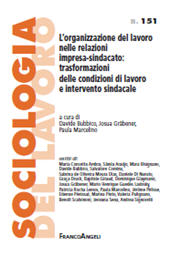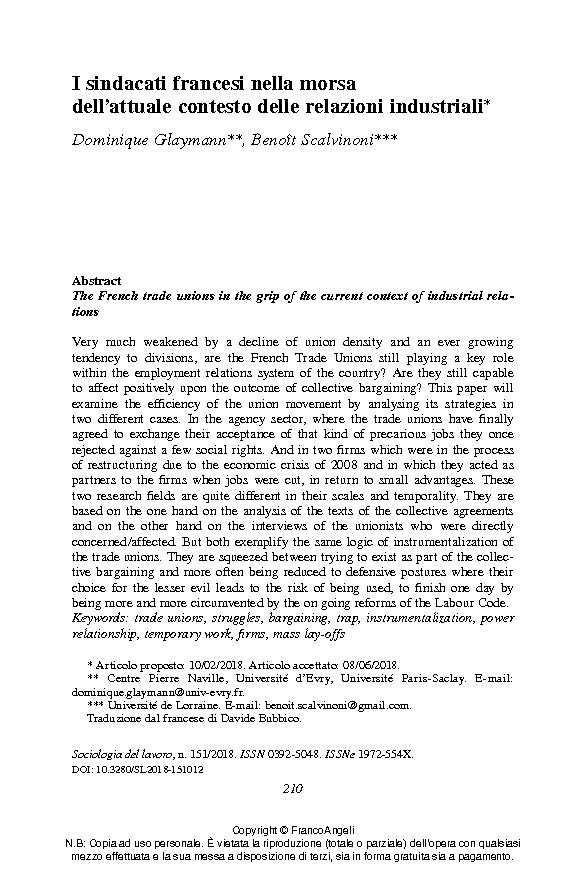I sindacati francesi nella morsa dell'attuale contesto delle relazioni industriali
210-234 p.
Indebolite da un calo della sindacalizzazione e da una sempre crescente tendenza alle divisioni, i sindacati francesi svolgono ancora un ruolo chiave all'interno del sistema di relazioni di lavoro del paese? Sono ancora in grado di influenzare positivamente il risultato della contrattazione collettiva? L'articolo in questione si propone di analizzare l'efficacia del movimento sindacale osservando la posizione tenuta di fronte alla diffusione del lavoro interinale, che ha visto sostanzialmente un'accettazione del sindacato in cambio della garanzia di alcuni diritti sociali, e di fronte ai processi di ristrutturazione che hanno fatto seguito alla crisi economica del 2008 dove la riduzione dell'occupazione si è accompagnata in generale all'ottenimento di compensazioni poco al di sopra da quanto previsto dalla legge.
I due campi di ricerca, diversi per scala d'analisi e temporalità, si basano, da un lato sull'analisi dei testi degli accordi collettivi attinenti al lavoro interinale e, dall'altro, su un'indagine qualitativa su due casi di ristrutturazione aziendale. In entrambi i casi è apparsa operativa la stessa logica di strumentalizzazione dei sindacati, schiacciati tra il tentativo di tenere in vita la contrattazione collettiva, seppure da una posizione difensiva, e tra l'indebolimento prodotto dalle continue riforme del codice del lavoro. [Testo dell'editore].
Very much weakened by a decline of union density and an ever growing tendency to divisions, are the French Trade Unions still playing a key role within the employment relations system of the country? Are they still capable to affect positively upon the outcome of collective bargaining? This paper will examine the efficiency of the union movement by analysing its strategies in two different cases. In the agency sector, where the trade unions have finally agreed to exchange their acceptance of that kind of precarious jobs they once rejected against a few social rights. And in two firms which were in the process of restructuring due to the economic crisis of 2008 and in which they acted as partners to the firms when jobs were cut, in return to small advantages. These two research fields are quite different in their scales and temporality.
They are based on the one hand on the analysis of the texts of the collective agreements and on the other hand on the interviews of the unionists who were directly concerned/affected. But both exemplify the same logic of instrumentalization of the trade unions. They are squeezed between trying to exist as part of the collective bargaining and more often being reduced to defensive postures where their choice for the lesser evil leads to the risk of being used, to finish one day by being more and more circumvented by the on going reforms of the Labour Code. [Publishers' text].
Is part of
Sociologia del lavoro : 151, 3, 2018-
Articles from the same issue (available individually)
-
Information
ISSN: 1972-554X
KEYWORDS
- Sindacati, contrattazione collettiva, conflitto sindacale, rapporti di potere, imprese, lavoro temporaneo, licenziamenti
- Trade unions, struggles, bargaining, trap, instrumentalization, power relationship, temporary work, firms, mass lay-offs



